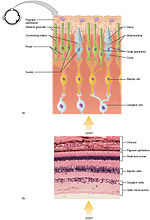Vertebrate visual opsin (redirect from Photopsin)
expressed in cone cells are called cone opsins. The cone opsins are called photopsins when unbound to retinal and iodopsins when bound to retinal. Cone opsins...
10 KB (1,049 words) - 21:31, 14 July 2024
of photopsins, the photopigments that 'catch' photons and thereby convert light into chemical signals. A typical human has three distinct photopsins: S-...
36 KB (3,281 words) - 12:49, 23 September 2024
respectively. Because humans usually have three kinds of cones with different photopsins, which have different response curves and thus respond to variation in...
16 KB (1,938 words) - 11:34, 23 August 2024
to form new, functional visual pigment (retinylidene protein), namely photopsin or rhodopsin. Visual phototransduction in invertebrates like the fruit...
20 KB (2,366 words) - 05:14, 10 September 2024
opsins, both involved in the formation of visual images: rhodopsin and photopsin (types I, II, and III) in the rod and cone photoreceptor cells, respectively...
39 KB (4,525 words) - 07:01, 5 April 2024
related to the functionality of cone cells, and often to the expression of photopsins, the photopigments that 'catch' photons and thereby convert light into...
99 KB (10,389 words) - 16:39, 1 November 2024
opsin genes are only 40% homologous (similar) to OPN1SW (encoding the SWS photopsin and located on chromosome 7) and "RHO" (encoding rhodopsin, and located...
19 KB (2,129 words) - 04:23, 20 June 2024
molecules of photoreceptor protein which is a combination of the protein photopsin in color vision cells, rhodopsin in night vision cells, and retinal (a...
22 KB (2,599 words) - 20:15, 24 October 2024
applied to opsin-type photoreceptor proteins, specifically rhodopsin and photopsins, the photoreceptor proteins in the retinal rods and cones of vertebrates...
3 KB (328 words) - 02:33, 16 July 2021
color blindness in which the gene for medium wavelength sensitive (green) photopsins is missing. Individuals with this form of colour blindness see every colour...
49 KB (5,469 words) - 14:09, 1 November 2024
dim light night vision in retinal rod cells couples to Gt1, and color photopsins in color vision in retinal cone cells couple to Gt2, respectively. Gt3/Gustducin...
12 KB (881 words) - 12:09, 31 July 2024
thereby discovering the first known cone opsin, they called apo-iodopsin photopsin (for its relation to photopic vision) and apo-rhodopsin scotopsin (for...
39 KB (4,404 words) - 12:15, 12 October 2024
Normalised absorption spectra of the three human photopsins and of human rhodopsin (dashed)....
47 KB (5,789 words) - 18:53, 16 October 2024
the OPN1MW gene, which encodes the medium wavelength sensitive (MWS) photopsin. The gene duplication is present in about 50% of X-chromosomes, so is...
3 KB (342 words) - 10:01, 30 December 2023
phototransduction. This enzyme catalyses the phosphorylation of cone (color) photopsins in retinal cones during high acuity color vision primarily in the fovea...
5 KB (520 words) - 12:18, 18 January 2024
that combine with retinal to form pigments called photopsins. Three different classes of photopsins in the cones react to different ranges of light frequency...
26 KB (2,939 words) - 19:34, 27 October 2024
of photopsins expressed: a correlation that holds for vertebrates but not invertebrates. The common vertebrate ancestor possessed four photopsins (expressed...
64 KB (7,928 words) - 05:02, 14 October 2024
subdivided into: Photopsins - those responsible for photopic vision (daylight), which are expressed in cone cells; hence also cone opsins. Photopsins are further...
83 KB (8,995 words) - 19:04, 16 October 2024
ideally aligned approximately with the spectral sensitivities of human photopsins. In this sense, they have a similar gamut to the human visual system....
27 KB (2,925 words) - 16:10, 25 October 2024
mediates pupillary reflex, involved in regulation of circadian rhythms Photopsin: reception of various colors of light in the cone cells of vertebrate...
8 KB (770 words) - 18:35, 10 May 2023
spectra. The three human photopsins absorb yellowish-green (photopsin I), green (photopsin II), and bluish-violet (photopsin III) light and are the basis...
12 KB (1,416 words) - 05:06, 29 November 2023
breaks down into opsin and retinal; iodopsin of cones breaks down into photopsin and retinal. The breakdown results in the activation of Transducin and...
21 KB (2,728 words) - 13:01, 9 October 2024
Various photoreceptors in the human eye such as melanopsin, rhodopsin, and photopsin communicate with the suprachiasmatic nucleus (the master circadian pacemaker...
88 KB (9,851 words) - 13:43, 8 October 2024
wavelengths of light. The opsins present in cone cells are specifically called photopsin. The spectral sensitivities of the opsins are dependent on their genetic...
31 KB (3,830 words) - 02:32, 8 September 2024













